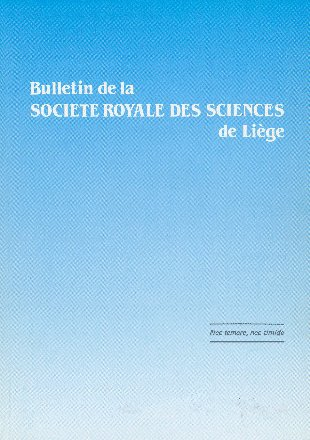depuis le 05 février 2011 :
Visualisation(s): 2011 (4 ULiège)
Téléchargement(s): 111 (0 ULiège)
Mots-clés : astronomie, astrophysique, extragalactique, photométrie, spectroscopie, supernovae
Abstract
We present optical photometric (upto 410 days since Bmax) and spectroscopic (upto 235 days since Bmax) observations of a type Iax supernova SN 2014dt located in M61. The broad band light curves follow a linear decline upto 100 days after which a significant flattening is seen in the late-time (beyond 150 days) light curves of SN 2014dt. SN 2014dt best matches the light curve evolution of SN 2005hk and reaches a peak magnitude of MB -18.12±0.04 with m15 1.35±0.06 mag. The earliest spectrum at 23 days is dominated by FeII and CoII lines with the absence of the Si II 6150 Å line. Using the peak bolometric luminosity we estimate a 56Ni mass of 0.14 M in the case of SN 2005hk and the striking similarity between SN 2014dt and SN 2005hk implies that a comparable amount of 56Ni would have been synthesized in the explosion of SN 2014dt. There are several explosion scenarios proposed for these peculiar events. Being one of the brightest and closest SN, SN 2014dt is an ideal candidate for long term monitoring. Late phase observations are very essential to understand the progenitor system and the actual explosion scenario for these events.
Keywords : astronomy, astrophysics, extragalactic, photometry, spectroscopy, supernovae
Pour citer cet article
Mridweeka Singh, Kuntal Misra, Devendra Kumar Sahu, Raya Dastidar, Anjasha Gangopadhyay, Subhash Bose, Shubham Srivastav, Gadiyara Chakrapani Anupama, Nand Kumar Chakradhari, Brajesh Kumar, Brijesh Kumar & Shashi Bhushan Pandey, «A Peculiar Subclass of Type Ia Supernovae a.k.a. Type Iax», Bulletin de la Société Royale des Sciences de Liège [En ligne], Volume 87 - Année 2018, Actes de colloques, First Belgo-Indian Network for Astronomy & Astrophysics (BINA) workshop - November 2016 - Nainital, India, 340 - 346 URL : https://popups.uliege.be/0037-9565/index.php?id=7768.
Aryabhatta Research Institute of observational sciencES, Nainital, 263001, India and Pt. Ravi Shankar Shukla University, Raipur, 492 010, India,
mridweeka@aries.res.inAryabhatta Research Institute of observational sciencES, Nainital, 263001, India
Indian Institute of Astrophysics, Koramangala, Bangalore, 560 034, India
Aryabhatta Research Institute of observational sciencES, Nainital, 263001, India
Aryabhatta Research Institute of observational sciencES, Nainital, 263001, India and Pt. Ravi Shankar Shukla University, Raipur, 492 010, India
Kavli Institute for Astronomy and Astrophysics, Peking University, 5 Yiheyuan Road, Haidian District, Beijing 100871, P R China
Indian Institute of Astrophysics, Koramangala, Bangalore, 560 034, India
Indian Institute of Astrophysics, Koramangala, Bangalore, 560 034, India
Pt. Ravi Shankar Shukla University, Raipur, 492 010, India
Aryabhatta Research Institute of observational sciencES, Nainital, 263001, India
Aryabhatta Research Institute of observational sciencES, Nainital, 263001, India
Aryabhatta Research Institute of observational sciencES, Nainital, 263001, India







